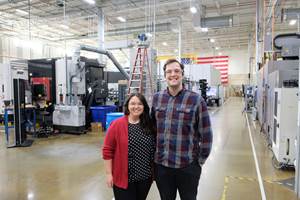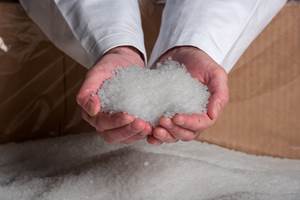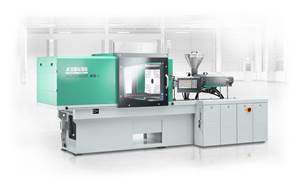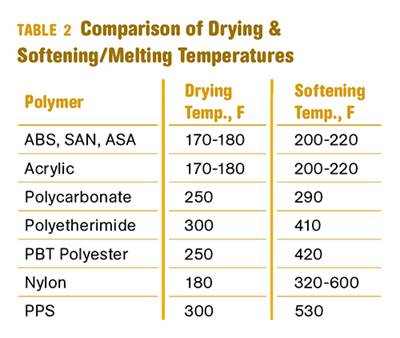Cleaning Up - January 2001
Dirty Oil Bottles Come Clean After a decade of development and many twists and turns, CO2-based recycling technology for HDPE motor-oil bottles is finally in the right place at the right time.
Dirty Oil Bottles Come Clean
After a decade of development and many twists and turns, CO2-based recycling technology for HDPE motor-oil bottles is finally in the right place at the right time. These bottles—2 billion of them a year in the U.S. alone—are messy to reclaim, owing to the oily residue they contain. Cleaning them with solvents or water generates hazardous waste. Now, the first commercial-scale equipment for a “clean” solution will be set up in April on a truck in Italy. It uses a process developed by Honeywell Federal Mfg. & Technologies in Kansas City, Mo., and equipment developed by Fedegari Autoclavi S.p.A. in Italy. The equipment will be marketed here by ITec International Technologies Inc. in Cincinnati.
Cleaning with gas
Liquid carbon dioxide under high pressure behaves like a solvent. It can separate oil from HDPE, allowing both the plastic and oil to be recovered in highly pure form, with no polluting byproducts. CO2 was applied to oil-bottle recycling back in the 1980s, but as a cryogenic coolant, not a solvent. The process was inefficient and never commercialized.
In the early 1990s, the U.S. Dept. of Energy began investigating liquid CO2 as an environmentally friendly degreasing agent and dry-cleaning solvent. It was applied to oil-bottle recovery by AlliedSignal (now Honeywell), which manages a DOE facility in Kansas City. Honeywell first worked with a small recycler, Blueberry Plastic Mill Inc. in Des Moines, Iowa. When Blueberry went out of business, Honeywell worked with FixCor Recycling in Heath, Ohio, which was molding pallets of recycled HDPE. FixCor got a California state grant to develop equipment for Honeywell’s patented process. But FixCor ran into financial difficulties and halted development in ’99.
Former FixCor president Gary DeLaurentiis and several others familiar with the Honeywell CO2 technology obtained a license from Honeywell to develop it. They set up ITec early last year to design and sell CO2 cleaning machinery to recyclers and oil-bottle makers worldwide.
The semi-continuous process uses multiple pressure vessels that can be small enough to mount on a truck. One or more vessels process a batch of material, while other vessels are being loaded or unloaded. Each batch takes about an hour. CO2 absorbs the oil in the liquid state and then releases it when it turns into a gas. CO2 is then recycled back into liquid. Total processing cost is about 3¢/lb, ITec says.
The Italian connection
Honeywell introduced fledgling ITec to Fedegari, a major European manufacturer of autoclaves and CO2-based extraction, degreasing, and dry-cleaning equipment. This was a big stroke of luck for ITec. “Fedegari’s experience dramatically shortened the development time,” says Robert Rothfuss, ITec executive v.p.
As DeLaurentiis and Rothfuss began commuting to Italy to work with Fedegari, they picked up Italian investors and customers. As it turned out, Italy had lots of pent-up interest in a mobile process to clean oil bottles, since the Italian government mandated separate collection of these bottles and strictly limited the ability to transport them because of the danger of spontaneous ignition inside a closed truck on a hot day.
By last July, Fedegari had built a prototype machine, which ITec markets as the ECO2 System. The first unit will be sold to O.P.T. Ltd. in Southern Italy, and six other Italian companies have ordered mobile systems that will travel to regional collection points such as gas stations.
—Jan H. Schut
In the U.S. alone, 2 billion one-quart oil bottles are discarded each year. They contain 250 million lb of HDPE and 15 million gal of oil residues. After a decade of development, a process using liquid CO2 can reclaim both the oil and plastic without generating hazardous waste.
Related Content
Scaling Up Sustainable Solutions for Fiber Reinforced Composite Materials
Oak Ridge National Laboratory's Sustainable Manufacturing Technologies Group helps industrial partners tackle the sustainability challenges presented by fiber-reinforced composite materials.
Read More‘Monomaterial’ Trend in Packaging and Beyond Will Only Thrive
In terms of sustainability measures, monomaterial structures are already making good headway and will evolve even further.
Read MoreCalculating an Injection Molding Machine’s Carbon Footprint
Arburg has utilized the ISO TS 1467:2018 standard, which determines the greenhouse gas emissions of a product, to help its customers calculate the product carbon footprint (PCF) of its injection molding machines.
Read MoreHow to Optimize Injection Molding of PHA and PHA/PLA Blends
Here are processing guidelines aimed at both getting the PHA resin into the process without degrading it, and reducing residence time at melt temperatures.
Read MoreRead Next
Advanced Recycling: Beyond Pyrolysis
Consumer-product brand owners increasingly see advanced chemical recycling as a necessary complement to mechanical recycling if they are to meet ambitious goals for a circular economy in the next decade. Dozens of technology providers are developing new technologies to overcome the limitations of existing pyrolysis methods and to commercialize various alternative approaches to chemical recycling of plastics.
Read MoreWhy (and What) You Need to Dry
Other than polyolefins, almost every other polymer exhibits some level of polarity and therefore can absorb a certain amount of moisture from the atmosphere. Here’s a look at some of these materials, and what needs to be done to dry them.
Read MoreLead the Conversation, Change the Conversation
Coverage of single-use plastics can be both misleading and demoralizing. Here are 10 tips for changing the perception of the plastics industry at your company and in your community.
Read More (2).jpg;maxWidth=970;quality=90)






 (2).jpg;maxWidth=300;quality=90)







 (1).jpg;maxWidth=970;quality=90)